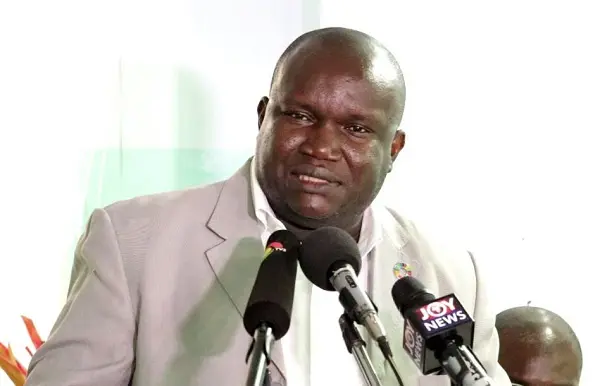A public spat between one of Ghana’s most vocal anti-galamsey advocates and a senior government official has laid bare tensions over how the country confronts illegal mining, with accusations of partisanship colliding against claims of environmental urgency.
Dr. Kenneth Ashigbey, Chief Executive Officer of the Ghana Chamber of Mines and convener of the Media Coalition Against Galamsey, has fired back at Stan Dogbe, Deputy Chief of Staff at the Presidency, after being accused of conducting a partisan fight against illegal mining.
The confrontation erupted after Dr. Ashigbey drew public attention to ongoing galamsey activities in the Simpa township along the Tarkwa to Takoradi road. “Around the Simpa township on the Tarkwa to Takoradi road, there is galamsey happening in clear sight,” he wrote on Sunday, October 5. “Is the Municipal Chief Executive (MCE) not aware? His Excellency John Dramani Mahama, please, this MCE cannot be representing your interests. I can see it from the road today, Sunday, the 5th of October 2025. They are working and polluting the waters.”
Dogbe’s response was sharp. He accused Dr. Ashigbey of conducting a politically motivated campaign, suggesting that if the previous New Patriotic Party (NPP) government had demonstrated the same political will currently deployed by the National Democratic Congress (NDC) administration, the galamsey crisis wouldn’t persist. “Instead of gaining on negativity as a form of advocacy, you and your team, as advised by the president, should keep up the fight, but I add do it constructively and stop hiding behind political bias to gain a voice,” Dogbe wrote.
That response prompted Dr. Ashigbey to publish a detailed rebuttal on his personal blog, rejecting what he described as falsehoods and partisan framing. “‘My government,’ really? Well, some in the NPP said the same,” Dr. Ashigbey wrote. “Thankfully, Ghanaians can judge my actions for themselves. My focus has never been on those who, like you, see every national issue through partisan lenses. My commitment is to Ghana and to those who genuinely care about our nation’s future.”
The mining executive reminded Dogbe of his advocacy’s consistency across political administrations. “When we began this fight in 2017, where were you?” Dr. Ashigbey asked. “What was your contribution to the struggle against galamsey under the NPP? Was that when you also thought our advocacy was ‘negative’? History will judge us all.”
Dr. Ashigbey defended his approach as solution-focused rather than merely critical. “Some of us are focused on solutions, not noise,” he wrote. “You may ask the Minister of Lands, Honourable Emmanuel Armah Kofi Buah. Whenever we engage, we present concrete proposals. We’ve even shared a comprehensive paper with His Excellency John Dramani Mahama, detailing actionable solutions. This is a matter of public record.”
The exchange grew more personal when Dr. Ashigbey addressed what he perceived as class differences informing their perspectives. “Perhaps you are not as concerned about the poisoning of our water bodies or the destruction of our environment,” he wrote. “Yes, you can now afford imported brands like Voss. I cannot. My children and family depend on the resources here in Ghana, the same ones being destroyed daily.”
That pointed reference to imported bottled water highlighted a reality facing many Ghanaians: while the wealthy can insulate themselves from environmental degradation through purchasing power, ordinary citizens remain vulnerable to polluted water sources caused by illegal mining.
Dr. Ashigbey concluded his rebuttal with a direct challenge. “I hold no political bias, and you know that. Yet, for reasons best known to you, you now seek to misrepresent me. I pray that God forgives you for the falsehoods you spread. The truth, and the internet, will not forget.”
The public confrontation comes days after Dr. Ashigbey participated in meetings with President Mahama and government officials about accelerating the galamsey fight. His willingness to immediately call out illegal mining operations he observed in Simpa suggests he intends to hold the administration accountable regardless of political considerations.
Whether that accountability is welcome or seen as unhelpful criticism appears to depend on one’s position within government. Dogbe’s response suggests some officials view persistent advocacy as political interference rather than civic duty. Dr. Ashigbey’s rebuttal makes clear he considers silence in the face of environmental destruction a betrayal of Ghana’s future.
The exchange raises uncomfortable questions about how Ghana navigates advocacy during a national crisis. Can environmental activists criticize government failures without being labeled partisan? Should officials treat constructive criticism as attacks? And who benefits when legitimate concerns get dismissed as political noise?
For Dr. Ashigbey, the answer seems straightforward. “Why should I stay silent when I see wrongdoing?” he asked. “Even the President himself has called on all of us to support the fight against galamsey. The Minister of Lands urged citizens to speak up when they see something wrong. Would you rather we disobey that call? So I ask: Do you want us to fix this problem, or do you not?”
Source: newsghana.com.gh











